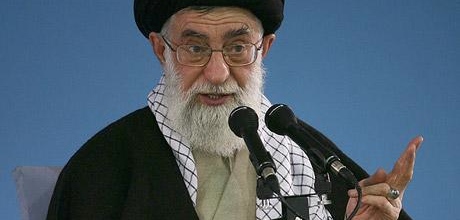Iranian Supreme Leader Ayatollah Ali Khamenei on Wednesday rejected the possibility that diplomatic initiatives publicly fronted by Foreign Minister Mohammad Javad Zarif would include broader rapprochement between Tehran and the West.
“There are no benefits in having relations or negotiations with the United States, except in certain specific cases,” Khamenei told a gathering of Iranian diplomats, according to a statement on his website.
“Of course, on the nuclear front, talks will continue. What (Foreign Minister Javad) Dr. Zarif and his team started and has been going well until now, will continue,” he said. “We will not ban them (the negotiations). But this has become yet another invaluable experience that interaction and talks with Americans have absolutely no effect in easing their animosity (towards Iran),” Khamenei said.
“Some people were under the impression that sitting down to talk with America would solve all our problems. I knew that wouldn’t be the case, but gave it a try due to the sensitive nature of the nuclear issue,” he said.
Al Monitor reported that Zarif had been showcased before Khamenei gave his remarks.
Before the speech, Zarif spoke. He thanked the supreme leader for his support and said, “We are determined to implement in the best way the foreign policy that was designed by the supreme leader.”
The outlet noted that Khamenei ‘has the final say on foreign policy matters, including the nuclear program and nuclear negotiations,’ a point that had been cited early by foreign policy analysts skeptical that the June 2013 election of Iranian President Hassan Rouhani would create the basis for sustained engagement between the West and the Islamic Republic.
There had subsequently been significant debate over the latitude that Iran’s negotiators had been given to make concessions, both specifically in the context of nuclear talks and more generally. A strange incident in October had seen Zarif reportedly hospitalized in the aftermath of potentially fabricated statements suggesting a broad readiness to warm ties with the West.
By December Reuters was ready to declare that “Iran’s political realities [were] sinking in” despite despite Iranian negotiators having sealed the interim Joint Plan of Action (JPA) to secure a softening of sanctions against Tehran, and that “hardliners who call the United States and its allies ‘world arrogance’ will be poised to pounce.”
In February senior Iranian officials linked to the Supreme Leader foreclosed the possibility that Iran would shutter nuclear facilities or dismantle nuclear infrastructure, and Khamenei himself declared in July that Iran would reject any agreement that did not allow a radical expansion of that infrastructure. Reuters described the latter as “underlining a gap in positions between Tehran and world powers as they hold talks aimed at clinching a nuclear accord,” while Arabic media outlets took the incident as evidence that “[Khamenei] and senior cadre of Iran’s Revolutionary Guard Corps will have the final say, while “[Zarf] and his technocrat nuclear team are only setting the tone on the international arena.”
[Photo: The Telegraph / Googleimages]




